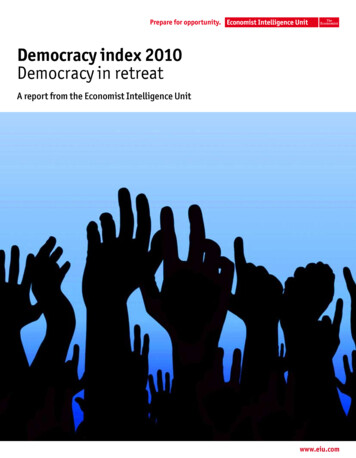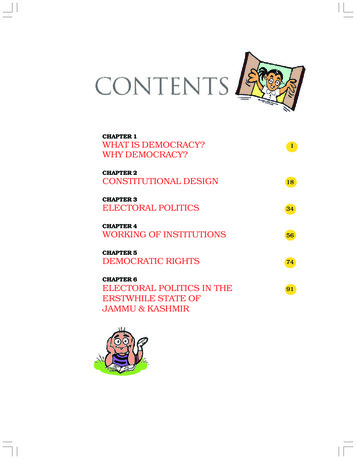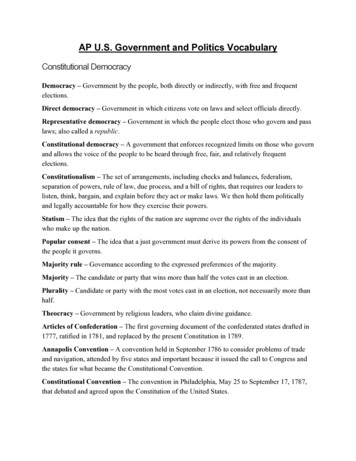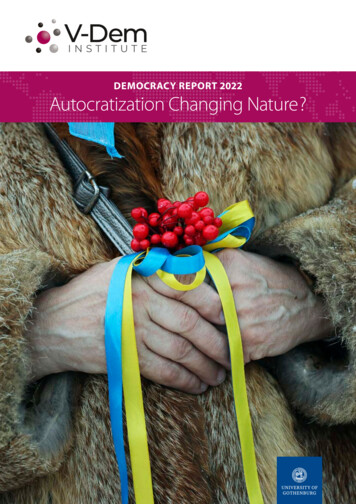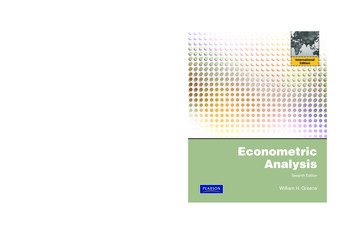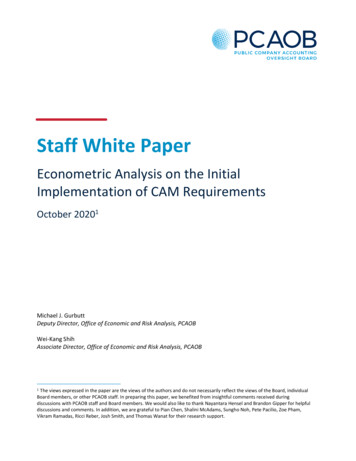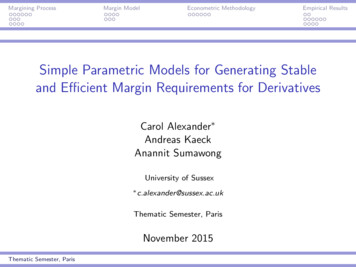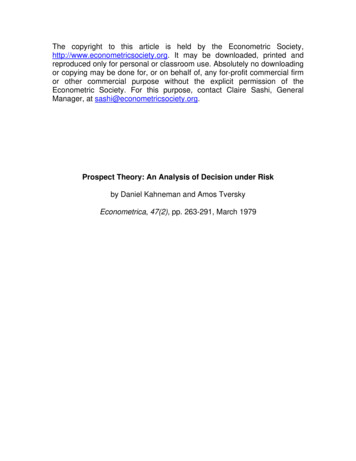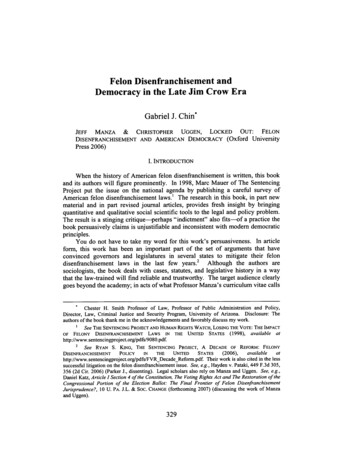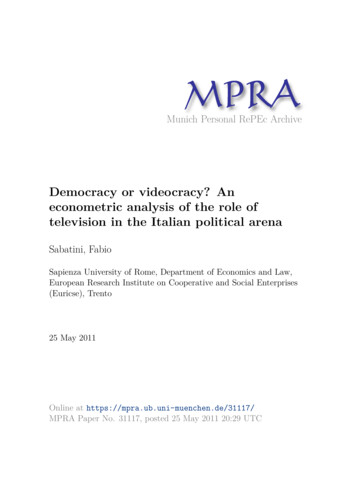
Transcription
Munich Personal RePEc ArchiveDemocracy or videocracy? Aneconometric analysis of the role oftelevision in the Italian political arenaSabatini, FabioSapienza University of Rome, Department of Economics and Law,European Research Institute on Cooperative and Social Enterprises(Euricse), Trento25 May 2011Online at https://mpra.ub.uni-muenchen.de/31117/MPRA Paper No. 31117, posted 25 May 2011 20:29 UTC
Democracy or videocracy? An econometric analysis of the roleof television in the Italian political arena1Fabio Sabatini 2 3 4 *This paper contributes to the literature by carrying out the first econometricinvestigation into the role of television in the formation of political consensus in Italy.Based on probit and instrumental variables estimates, we find trust in television to bethe most significant predictor of trust in the Italian prime minister. The latter is alsostrongly and negatively correlated with trust in the judicial system and tolerancetowards immigrants.: trust; institutions; democracy; television; media; social capital; Italy;instrumental variables.: D720; D830; H8; L820; Z1; Z131The empirical analysis in this paper is based on data collected within a research project promoted and funded by theEuropean Research Institute on Cooperative and Social Enterprises (Euricse), Trento. The findings, interpretations andconclusions expressed in the paper are solely of the author and do not necessarily represent the views of Euricse. I amdeeply indebted to Damiano Fiorillo for precious suggestions and conversations on our research topics. I am grateful toAlessandra Gualtieri and Michela Giovannini for helpful comments. Needless to say, usual disclaimers apply.2Department of Economics and Law, Sapienza University of Rome.3European Research Institute on Cooperative and Social Enterprises (Euricse), Trento.4*Health, Econometrics and Data Group, University of York.Email: fabio.sabatini@uniroma1.it. Postal address: Sapienza University of Rome, Faculty of Economics, via delCastro Laurenziano 9, 00161, Roma – Italy.
Silvio Berlusconi has dominated Italian political life since he was first elected prime minister in1994. He is now in his third term, although the terms were not consecutive. He is the secondlongestAserving prime minister of Italy, after Benito Mussolini, and, as of May 2011, he is thelongestAserving current leader of a G8 country. This political longevity is often difficult tounderstand for foreign political analysts. The Italian prime minister has an extensive record ofcriminal allegations, including mafia collusion, false accounting, tax fraud, corruption and briberyof police officers and judges5. Recently, he has even been charged with child prostitution. In afamous editorial published ten years ago in April 2001, respected British newsmagazinestated that: “In any selfArespecting democracy it would be unthinkable that the manassumed to be on the verge of being elected prime minister would recently have come underinvestigation for, among other things, moneyAlaundering, complicity in murder, connections withthe Mafia, tax evasion and the bribing of politicians, judges and the tax police”6. According to, one of the main explanations of Mr Berlusconi’s political success is his exceptional gripon Italy’s media. “Through hisempire, he controls most of Italian private television. Asprime minister, he indirectly controls Italian public service television (,7RAI), giving him influence over some 90% of Italian TV” . The media power that Berlusconi hasbuilt his empire on is indeed unimaginable in any other western democracy8.Not surprisingly, rightist opinion leaders argue that television does not influence political opinion.This view is widespread in the Italian political debate and leads commentators to affirm that, even ifItalians are well aware of Mr Berlusconi’s criminal allegations as well as of his personal andpolitical limitations, they actually trust the prime minister because they feel a deep affinity withhim. This argument implies that Mr Berlusconi’s political success is not specifically related to thepower of his media empire to bias public opinion. If the assumption of television’s irrelevance wastrue, one could reasonably expect to find no significant individualAlevel relationship between trustin television and trust in the Italian prime minister.So far it has been impossible to carry out an econometric test of this thesis. The mostcomprehensive Italian surveys are conducted by public institutions, such as the National Bureau ofStatistics and the Bank of Italy, which cannot collect information on interviewees’ politicalpreferences. On the other hand, political opinion polls carried out by private agencies cannotadminister excessively long questionnaires able to collect comprehensive data on the social andeconomic background of respondents.5The mafia prosecution was dropped due to the expiration of statutory terms for preliminary inquiry (see for exampleGinsborg 2005). False accounting prosecution was dropped because of a law passed by Berlusconi’s parliamentarymajority that made false accounting illegal only if a specific damaged party reports the fact to the authorities (see forexample Blondel and Segatti 2003). For bribery of judges and tax evasion, charges were dropped because the statute oflimitations had expired (see for example Warner 2007). Trials for bribery, corruption and child prostitution are currentlyin progress (see for example Center for the Study of Democracy 2010).6, “An Italian story”, published in the issue of April 28th 2001. This issue the cover title: “Why SilvioBerlusconi is unfit to lead Italy” and provoked a heated debate in Italy. In July 2001 Mr Berlusconi launched a lawsuitin Italy alleging thathad defamed him in the article. The court in Milan has issued a judgment rejectingall of Mr Berlusconi’s claims and requiring him to make a payment for costs to. Mr Berlusconi’slawyers have announced that he will appeal.7, “Mamma mia. Italians may come to regret electing Silvio Berlusconi once again”, published on April17th 2008.8It must be remembered that RAI has never been an independent public service broadcaster, since it has always beensubject to the distribution of posts and power according to political affiliation. As head of the government, Berlusconihas de facto power to appoint the managers of RAI and the directors of the majority of RAI’s information andentertainment broadcasts. RAI channels have traditionally been divided along political lines.andarerelatively centre right and currently give manifest support to Mr Berlusconi’s government., the most independentchannel of the public broadcasting system (PBS), is commonly viewed as the opposition channel (Brevini 2010).2
In this paper, we use a unique dataset to carry out the first econometric investigation into therelationship between trust in television and trust in the Italian prime minister. Raw data werecollected through the administration of a questionnaire to a representative sample ( 817) of thepopulation of the Italian Province of Trento in March 2011. The sample was stratified by age,gender and area of residence. The questionnaire was specifically designed for the evaluation ofindividuals’ values, beliefs and behaviours, along with a wide range of relevant socioAdemographicand economic characteristics9.Our dependent variable is measured through the question: “Do you think that the prime minister canbe trusted?”. Interviewees were asked to give a score from 1 to 10 for their trust, 1 meaning “Not atall” and 10 meaning “Totally”. The main independent variable is trust in television, as measured bythe score from 1 to 10 given by respondents to the question: “Do you think that television can betrusted?”.Probit and ordered logit estimates clearly show that trust in television is the most significantpredictor of trust in the prime minister and that this finding is robust to different specifications.However, there are three reasons for which this result could be interpreted as the fruit of a spuriouscorrelation. First, it is difficult to distinguish the effect of trust in television from that of otherphenomena that potentially influence trust in the prime minister. To deal with this problem, weinclude in the trust equation a wide set of individual and household control variables. We place aspecial focus on the possible role of social capital, which is traditionally claimed to play a role inmaking democracy work at the community level. Specifically, we account for multiple indicators ofboth structural and cognitive dimensions of social capital. Second, individual effects, such asindividuals’ exogenous shocks, may be correlated with trust both towards television and the primeminister, thus creating a common bias. Third, it is reasonable to assume the existence of reversecausality: Mr Berlusconi’s television empire has helped shape the country’s imagination over ageneration, and the prime minister invites citizens to trust his media. To deal with the last twoproblems, we turn to instrumental variables (IV) estimates.When we address endogeneity in IV estimates, trust in television remains the best (most significantand strongest) predictor of trust in the prime minister. Interestingly, trust in the press is not anexplanatory variable. Social capital variables are also found to be irrelevant. Certain categories ofselfAemployed workers – i.e. farmers and members of professions – are found to be more likely totrust the prime minister. By contrast, we find that the dependent variable is significantly andnegatively correlated with trust in the judicial system and with a measure of tolerance towardsimmigrants.Even if these results pass robustness checks and hold in IV estimates, it must be remarked that thecrossAsectional design of the research dictates extreme caution in the interpretation of correlationsas causal relationships. Nonetheless, the paper contributes to the literature by carrying out the firsteconometric investigation into the role of television in individuals’ political opinions, with a focuson trust towards the Italian prime minister. The relationship between television and politicalattitudes and beliefs is an important topic for economics, in view of the unquestionable role thatpolitical institutions, particularly the government and the prime minister, play in a country’seconomic performance (Besley and Burgess 2002; Connolly and Hargreaves Heap 2007). However,this topic is largely neglected in the literature. This paper aims to take a step in filling that gap. Theuse of a unique and very recent (March 2011) dataset collected in a region traditionallycharacterized by efficient public institutions and very contained inequalities adds further value tothe analysis.The remainder of the paper is organized as follows. The next section describes the data and ourempirical strategy. Section 3 presents and discusses the results of the estimates. Concluding remarksand a brief discussion of policy implications close the paper.9The questionnaire was administered through computer assisted telephone interviewing by the Technical Unit of theDepartment of Sociology and Social Research of the University of Trento.3
Our dependent variable is given by responses to the question: “Do you think that the prime ministercan be trusted?”. Interviewees were asked to give a score from 1 to 10 for their trust, 1 meaning“Not at all” and 10 meaning “Totally”. We followed the approach to code 1 for responses above 6.Still, all results presented in this paper are robust to a different specification of the dependentvariable in which responses above the mean value are coded 1. It must be stated that interviewersdid not explicitly mention the name of Silvio Berlusconi. So, it is theoretically possible that somerespondents’ answers referred to the institution of the presidency of the council of ministers, ratherthan to the person of the prime minister. However, the questionnaire was administered in March2011, when the man and his institutional office were virtually indistinguishable. In our view, in thecontext of the contemporary Italian political arena, the assumption that the aboveAmentionedresponses can be used to score citizens’ trust towards Mr Berlusconi is reasonably reliable.Trust in television is measured by the score from 1 to 10 given by respondents to the question: “Doyou think that television can be trusted?”, 1 meaning “Not at all” and 10 meaning “Totally”.Our choice to focus on the Province of Trento was due to results from recent empirical studieswhich found the territory to be characterized by contained inequalities, efficient public institutions,and above average levels of material and subjective wellAbeing (Degli Antoni 2006, 2009; Fiorillo2008; Sabatini 2008, 2009a; Villa and Zola 2008). Administratively, the Province enjoys a largedegree of autonomy in the following sectors: health, education, welfare and transport infrastructure.In our view, these characteristics do not imply a particular bias in terms of political opinions. Morein particular, we argue it is not possible to establish whether the traditionally wellAknown efficiencyof local public institutions could reinforce trust towards the Italian prime minister as an institutionin himself, since the Province has been governed by centrist or centreAleftist coalitions for a longtime. Overall, results from past elections suggest that political opinions of the Trentino Region’s10population seem not to be particularly biased in favour Mr Berlusconi’s party (see Table A2 in theAppendix).In Model 1 we control for a number of socioAdemographic and economic characteristics (seecolumn 1 in Table 2). At the household level, the analysis accounts for a measure of economic wellAbeing given by responses to the question: “Is your household’s income sufficient to see you throughto the end of the month?”. Respondents were asked to give a score from 1 to 5, with 1 meaning“With great difficulty” and 5 meaning “Very easily”. We coded 1 for negative responses (i.e. “Withgreat difficulty” and “With difficulty”) and used the label “Poor” to indicate the dichotomousvariable in regressions. Robustness checks were performed by replacing this measure with twoother indicators of economic wellAbeing. The first is given by responses to the question: “Howwould you place your household income in respect to the average income of Italian households?”.Respondents were asked to give a score from 1 to 5, 1 meaning “Much below the average” and 5meaning “Much above the average”. The second measure of economic wellAbeing used inrobustness checks is given by responses to the question: “Overall, how satisfied are you with youreconomic situation?”. Once again, interviewees were asked to give a score from 1 to 10, with 1meaning “Not at all” and 10 meaning “Totally satisfied”.At the individual level, the analysis accounts for the following control variables:A Education, treated as an ordinal variable where each category corresponds to a degree ofeducational qualification. Results do not change if we include dummy variables corresponding toeach level of qualification.10Hereafter we will use “Province of Trento” and “Trentino Region” as synonyms.4
A Work status, as indicated by a number of dummies reporting whether the interviewee is a blueAcollar worker, office worker, teacher, managerial employee, member of profession, entrepreneur,farmer, pensioner, homemaker, or unemployed. Students are the omitted category in regressions.A Usual socioAdemographic controls such as gender, being in a stable relationship, age, and the areaof residence (urban vs. rural).All the variables are described in detail in Table A1 in Appendix A. Summary statistics are reportedin Table 1.The measurement of social capital is a delicate and controversial issue which we prefer not todiscuss here. For a comprehensive survey of methodological problems in the empirical literature onsocial capital, we refer the reader to the reviews in Fine (2001, chapter 10), Durlauf and Fafchamps(2005) and Sabatini (2007, 2009a, 2009c). In model 2, we account for the “structural”Table 1. Summary statisticsTrust in the Italian prime minister754.229443.4207537Trust in television817.5911873.4919157Membership of associations817.3206854.467026Number of associations817.5446756.9565431Volunteer unpaid work for associations817.2729498.4457481Help to strangers within volunteering activities817.2056304.4044091Participation in associational meetings817.2888617.4535111Social trustTrust in the judicial ce towards non EU immigrants817.7380661.4399562Tolerance towards EU immigrants817.8567931.3504982Tolerance towards drug or alcohol addictsAge 35A49817817.4381885.2949816.4964686.4563139Age 50A64817.2325581.4227216Age 65 and ng in a stable relationship817.7172583.4506078Educational qualification (ordinal)8174.4528761.48375Precarious worker817.0110159.104441BlueAcollar worker817.122399.3279469Office 5Managerial employee817.0183599.1343311Member of 817.0832313.2764008Area or residence (urban vs. rural)817.3561812.479163Poor817.1505508.35782955
dimensions of the concept. The structural dimension deals with individuals’ behaviours and cantake the form of relational goods consumption, participation in social networks, and volunteeringactivities. Cognitive social capital deals with agents’ perceptions and involves concepts such astrust, reciprocity, and shared beliefs (Uphoff 1999).In this paper, we measure structural social capital through membership of voluntary organizations,as given by a number of indicators capturing:A the number of associations in which the interviewee participates, both through a formalmembership or through informal participatory activities.A The type of association, as measured by a number of dummy variables. In particular, the analysisincludes cultural, recreational, health and assistance, advocacy, environmental and religiousassociations.A Attendance at associational meetings, measured through a binary variable coded 1 if therespondent had joined meetings in the last 12 months before the interview.A Volunteering, measured through a binary variable coded 1 if the respondent had done unpaidvolunteer work in the last 12 months before the interview.A Altruism, measured through a binary variable coded 1 if the respondent had concretely helpedstrangers within her volunteering activities in the last 12 months before the interview.In model 3 we add measures of cognitive social capital, as given by two indicators of social trustand trust towards the institutions, and three indicators of “tolerance”. Social trust was measuredthrough the standard trust question, “In general, do you think most people can be trusted or can’tyou be too careful?”, conceived by Elisabeth NoelleANeumann and introduced to large U.S. surveysby Rosenberg (1956). Institutional trust is measured through the scores from 1 to 10 given byresponses to the question “Do you that the judicial system can be trusted?”, with 1 meaning “Not atall” and 10 meaning “Totally”. In both cases responses were recoded 1 if their value was above themean.In principle, it could be argued that at the community level a vibrant social environment whichallows people to meet frequently and to share information, opinions and experience might scaledown the role of mass media in the formation of political preferences. Indeed it seems somewhatsignificant that the Province of Trento, which according to previous studies enjoys an exceptionalwealth of community social capital (Sabatini 2008, 2009b), has always exhibited a relativelymoderate consensus for the prime minister’s party. However, as column 2 of Table 2 reports, mostsocial capital variables are found to be irrelevant at the individual level.Tolerance was measured through the question: “Which of these categories of people would you bewilling to have as neighbours”, where categories were non EU immigrants, EU immigrants, alcoholor drug addicts, and people who declare themselves to be racist.As will be reported in section 3, probit estimates clearly show that trust in television is the mostsignificant predictor of trust in the prime minister, and that this result is robust to differentspecifications. However, as we mentioned in the introduction, individual effects or other unknownphenomena which we may not be able to account for within the model could be correlated with boththe dependent variable and the main regressor, thus creating a common bias. Moreover, there arereasons to suspect the existence of reverse causality: Mr Berlusconi owns or controls the majority ofthe Italian broadcasting system, so it is reasonable to argue that trusting Mr Berlusconi may alsolead citizens to trust his television channels. After a simple regressionAbased test of endogeneity, wedeal with this issue by means of instrumental variables (IV) estimates.In IV estimates, we use two individualAlevel instruments for trust in television given by the qualityof friendships and trust in the press. As the tests reported in section 3 show, these variables satisfythe two necessary conditions for instrument validity, since they are both strongly correlated withtrust in television (“relevance” condition) and they are both orthogonal to the disturbance term ofthe trust in the prime minister equation (“orthogonality” condition).6
The quality of friendships is measured through individuals’ reported satisfaction with relationshipswith friends, as given by responses to the question: “How satisfied do you feel with yourrelationships with friends?”.The relationship between television, relational goods and life satisfaction has already been analyzedin the literature (Putnam 1995; Corneo 2005; Bruni and Stanca 2006, 2008; Frey et al. 2007).Drawing on data from the first wave of the European Social Survey, Frey et al. (2007) find thatwatching TV is positively related to people’s material aspirations and negatively related to theirtrust in others as well as to relative frequency of social activities. Bruni and Stanca (2006, 2008) usedata from the World Values Survey to show that television viewing plays a key role in reducinghappiness through two main mechanisms. First, it crowdsAout relationality (Bruni and Stanca 2008).Second, it contributes to raising individual material aspirations, thus lowering the effect of higherincome on happiness (Bruni and Stanca 2006). Antoci, Sabatini and Sodini (2011a, 2011b) showthat under certain conditions the crowding out hypothesis can be generalized to various kinds oftechnologyAintensive consumption, with an exception made for the Internet.It must be stated that, in respect to the above mentioned literature, in this paper we measure trust intelevision instead of viewing TV. This difference is critical to the purpose of our study for two mainreasons. First, as stated by Frey et al. (2007), subjective time use data may be inaccurate or biased:“Watching television might not be understood in the same way by all respondents, and they mightnot differentiate between television viewing as primary, secondary or even tertiary activity.Respondents might not even correctly remember all the times they were watching television” (p.290). Moreover, people may watch television without trusting the reliability of its contents. Forexample, spectators of reality shows are often aware that characters are actually following a script,but they are likely to enjoy the show even if they do not trust its “reality” at all.Moreover, we refer to relational goods in terms of their quality, rather than to the mere frequency oftheir consumption. Friendship is a qualitative concept which cannot be measured just through thefrequency of meetings with friends. Following Diener and Seligman (2002), in this paper we usesatisfaction with relationships with friends as a proxy for the “quality” of friendship. The quality ofrelationships with friends has been found to be strongly associated with aspects of wellAbeing suchas happiness (Baldassarre et al. 1984; Argyle 1987; Myers 1999;Deci and Ryan 2001; Diener andSeligman 2002; Lyubomirsky et al. 2006; Demir and Weitenkamp 2007; Van Praag and FerrerAiACarbonell 2008; Sabatini 2011) and health (Fiorillo and Sabatini 2011). Drawing on a sample of222 undergraduate students, Diener and Seligman (2002) find that the subjective rating ofrelationships with close friends is the best predictor of happiness. Demir et al. (2007) use a sampleof 280 college students to analyze the role of best and close friendships in happiness. The authorsfind that best friendship quality – as measured by the subjective rating of respondents’ relationshipswith their best friends – is the only significant predictor of happiness.In the population object of our investigation, the frequency of contact with friends exhibits a weakand positive correlation with trust in television11. By contrast, the quality of friendships is found tobe significantly and negatively correlated with trust in TV by probit and first stage IV estimates.Arguably, satisfactory relationships which entail mutual trust as well as the exchange of ideas andinformation may reduce the role of television in the obtaining of social and political information,thereby preventing individuals from uncritically evaluating broadcasting contents. The significanceof the correlation, along with the tests of the joint significance of coefficients carried out in section3 (see Tables 3 and 4), support the assumption that this variable is a relevant instrument.As for the orthogonality condition, it must be stated that several studies find the quality offriendships to be correlated with certain domains of trust, such as social trust. However, the latterconcept is extremely different from the dependent variable we use in the empirical analysis. Insupport of the hypothesis of orthogonality, probit and ordered logit regressions do not find anysignificant correlation between the quality of friendships and trust in the Italian prime minister.11Estimates are available upon request to the author.7
The other instrument we use in the analysis, i.e. trust in the press, may be subject to greatercontention. One could argue that people who trust the press are not likely to behave and think sodifferently from those who trust television. Indeed we find the two variables to be significantlycorrelated in our sample through probit estimates and first stage IV estimates ( value 0.000). Thetest of the joint significance of coefficients (see Tables 3 and 4) also supports the assumption thatthis variable satisfies the relevance condition. However, this correlation does not imply that trust intelevision and trust in the press are able to bias political opinions to the same extent and in the samedirection.There are at least three reasons to suspect that the orthogonality condition might be satisfied. First,television and the press are very different media. As stated by Frey et al. (2007), “TV viewing ischaracterized by immediate benefits and negligible immediate marginal costs.” (p. 287, italic is ours). By contrast, reading the press requires an active and mindfulchoice of newspaper, as well as the act of going to a kiosk and paying for the purchase. Comparedto reading newspapers, watching TV has virtually no entry barriers, especially in the case oftelevision channels owned or controlled by Mr Berlusconi (and public service channelscan be viewed free of charge). Moreover, as reported by Frey et al. (2007), there is anecdotalevidence that individuals may have selfAcontrol problems in watching television: it is hardlyarguable that the activity of reading newspapers can cause similar problems.Second, newspaper readers are far fewer in number than TV viewers (Istat 2008). Thus, people whoreport that they trust the press are not necessarily habitual readers. By contrast, people who trust TVare more likely to be habitual watchers. Overall, in Italy the press is a less influential and pervasivemedia than the television.Third, the Italian press is much more pluralist than Italian television. Mr Berlusconi’s familydirectly owns “only” a small number of newspapers and several magazines, not the majority12.Overall, it is possible to state that Italian newspapers more or less equally represent all politicalviews. Thus, trust in the press cannot be correlated with a definite bias in terms of trust or distrusttowards the prime minister. Moreover, local newspapers published in the Province of Trento aretraditionally moderate and try to remain equidistant from political alignments.In light of the arguments discussed above and of the estimates carried out within the empiricalanalysis, it seems reasonable to assume that, in the population under investigation, there is no directlink between trust in the press and trust in the prime minister. Moreover, as mentioned earlier, wetest the validity of our instruments with overAidentification tests presented in Tables 3 and 4.Our empirical model of trust in the Italian prime minister can be represented through the followingestimation equation:! * α # ' β !" ' γ 'δ ε(1)where ! is trust in the prime minister for individual at time , # is trust in television, !" are thesocial capital variables (both structural and cognitive) defined at the individual level, the vector12Berlusconi owns, the largest Italian publishing house which owns over 50 magazines,including, one of the country’s most popular news magazines, and " , and # !" % , two of themost popular tabloids. His brother, Paolo Berlusconi, owns and operates &, a right wing newspaper whichprovides a strong proABerlusconi slant on Italy and its politics. ' ( , one of the mo
Democracy or videocracy? An econometric analysis of the role of television in the Italian political arena Sabatini, Fabio Sapienza University of Rome, Department of Economics and Law, European Research Institute on Cooperative and Social Enterprises (Euricse), Trento 25 May 2011 Online at https://mpra.ub.uni-muenchen.de/31117/

